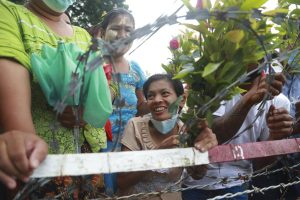Myanmar’s military junta has released more than 5,600 people in an amnesty for people arrested for protesting against or otherwise resisting the army’s seizure of power in February.
Senior Gen. Min Aung Hlaing, who led the February coup and has since installed himself at the head of a “caretaker government,” announced the amnesty in a televised address on Monday. State television said it included 1,316 convicts arrested for anti-coup protests and 4,320 others pending trial whose charges would be suspended, according to The Irrawaddy.
Min Aung Hlaing tied the timing of the amnesty to the upcoming annual Thadingyut festival, suggesting that it could help restore peace and stability to the country, after eight months of turmoil.
Beginning on Monday night and extending into yesterday, crowds gathered outside prisons around the country to greet friends and relatives who were released. The AP reported on the scenes at Yangon’s Insein Prison, where a stream of buses bore released detainees through an ebullient crowd, some of whom “handed roses through the vehicles’ open windows.”
The prisoner release, which included Monywa Aung Shin, the former information minister of the National League for Democracy (NLD) government, in addition to a number of well-known politicians, celebrities, film actors, and journalists, coincided with the decision of the Association of Southeast Asian Nations (ASEAN) to exclude Min Aung Hlaing from its upcoming summit.
The move, which was agreed during an emergency meeting on October 15, reflected ASEAN’s frustration with the junta’s lack of cooperation in the implementation of a Five-Point Consensus that it agreed in April. In particular, the bloc was frustrated by the lack of access granted to its special envoy, Brunei’s Second Foreign Minister Erywan Yusof.
But it is important not to confuse correlation with causation. Even if the amnesties were designed to some extent with international opinion in mind – Richard Horsey of the International Crisis Group told AFP that they were “a tactical response to a pretty hostile domestic and international environment” – they should not be taken as a sign that the junta is slackening its hold over the country, nor softening in its determination to consolidate its February coup. Over the past eight months, the government has undertaken two other rounds of amnesties, designed to free up valuable prison-space for fresh arrests. Similar tactics were also used by the old junta that ruled the country for the five decades to 2011.
Indeed, in the same speech that he announced the prison amnesties, Min Aung Hlaing said that ASEAN should consider the violence being carried out by its opponents, who he described as “terrorist groups.” “No one cares about their violence, and is only demanding we solve the issue,” he said. “ASEAN should work on that.”
Moreover, while the amnesties included a number of prominent individuals and revoked charges against 34 artists and celebrities who are in hiding, important political prisoners, such as ousted State Counselor and NLD leader Aung San Suu Kyi and President Win Myint, remain in detention.
Indeed, there were some reports of amnestied prisoners in some places being immediately rearrested and slapped with new charges. According to the AP report, which cited a family member of a prisoner, 11 of 38 people who were released Monday night from Meiktila Prison is central Myanmar were rearrested at the prison gate; the BBC reported something similar. Those rearrested included officials and members of the NLD as well as street protesters.
Even for those who were released, the threat of re-arrest will remain a continual threat. The amnesty was authorized under Section 401 sub-section (1) of the Criminal Procedure Code, which states that if a detainee commits another offense after their release, they will be made to serve the balance of their current sentence in addition to any sentence related to the new crime.
In an interview with Radio Free Asia, Tun Kyi, a spokesperson for the Ex-Political Prisoner Society, a local civil society group, described the released detainees as “political hostages.” “These prisoners have been held as political hostages and were freed due to international pressure,” he said. “We have seen this kind of action many times from military dictatorships in the past.”
The prison amnesties are no doubt a welcome development, in that they reunite families and communities that have been fractured by the military’s disastrous seizure of power. But in the longer term, they give little indication that the junta is even beginning to recognize the extent of the curse it has laid on Myanmar.

































